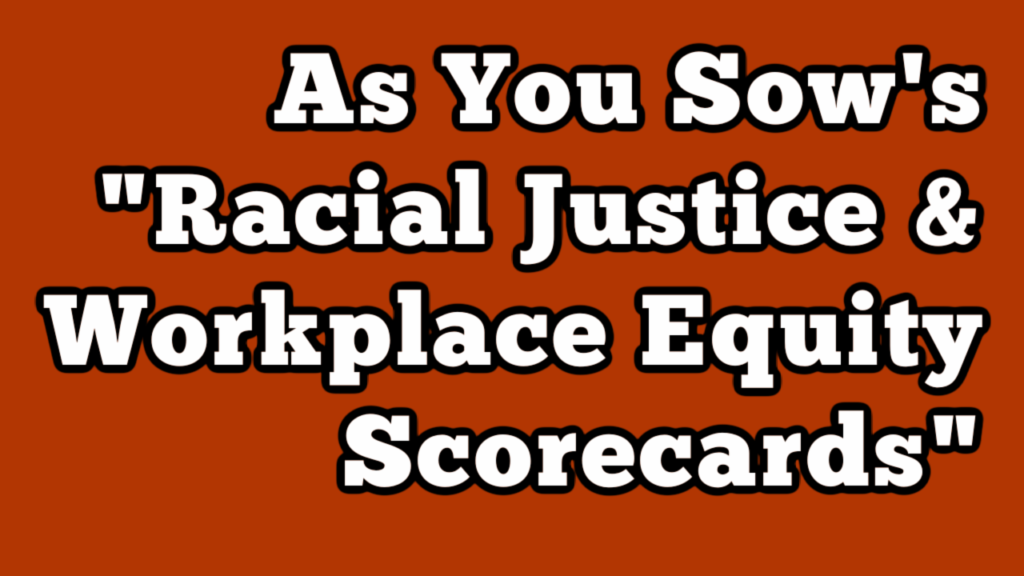As You Sow’s “Racial Justice & Workplace Equity Scorecards”

– As You Sow has two scorecards for the S&P 500: Racial Justice Scorecard and Workplace Equity Scorecard
– 46% of the 100 largest companies release consolidated EEO-1 information
– 15% of the S&P 500 release a quantifiable goal related to their workplace diversity, equity and inclusion goals
Here’s the intro from this blog by Liz Dunshee of TheCorporateCounsel.net: As You Sow is out with a pair of new scorecards for the S&P 500 (and they’ve filed a bunch of related shareholder proposals):
– Racial Justice – scoring companies based on their “racial justice statements,” corporate policies and practices across 22 data points
– Workplace Equity – assessing the quality of companies’ DEI disclosuresTo gather data, they are looking at websites (including reporting/disclosure and career pages), social media accounts, and sustainability reports. The results of the findings are available as an overall composite list of the “top 10” & “bottom 10” – and also can be sorted by sector, HQ state, region, market cap, and number of employees. Here’s some of the key “Workplace Equity” findings:
– The largest companies by market cap, and the largest employers by headcount, are most likely to release meaningful workplace diversity and inclusion data.
– Almost half (46%) of the 100 largest companies by market cap in the S&P 500 release their consolidated EEO-1 forms, a good first step for sharing workplace composition. Within the 100 largest employers in the S&P 500, more than 1 in 4 do so. Of the companies that fall within both categories 30 of 53 (57%) release this form.
– More than 1 in 4 of the largest 100 companies release their recruitment rates of female employees. Almost 1 in 5 release their retention rates of female employees, and 1 in 10 release their recruitment rate of female employees.
– Disclosure rates of recruitment, retention, and promotion data by race and ethnicity is still catching up to gender data, likely a reflection of the #metoo movement gaining traction in 2017, while the protests in the aftermath of George Floyd murder began in late May, 2020, less than a year ago.
– Across sectors, a few companies have shown early leadership in publishing recruitment, retention, and promotion data by race and ethnicity. These companies include: Allstate, Apple, BlackRock, Norfolk Southern Corp and Oracle Corp which release their recruitment rates; Alphabet, Edison International, Intel, PVH Corp and Twitter, which release retention rates; and Consolidated Edison, Goldman Sachs, Progressive, Twitter and Walmart which release promotion rates.
– 16% of the S&P500 release at least one recruitment statistic related to race or ethnicity. Within the 100 largest companies by market cap, 23% do so. Within the 100 largest employers, 23% do so.
– 15% of the S&P 500 have released a quantifiable goal related to their workplace diversity, equity and inclusion goals. Within the 100 largest companies by market cap, 22% do so. Within the 100 largest employers, 22% do so. Of the companies that fall within both categories 13 of 53 (25%) release this form.
Also see page 9 of Insightia’s September newsletter for an interview with As You Sow’s CEO Andrew Behar. Here’s an excerpt:
What is As You Sow doing to promote racial and ethnic equity at portfolio companies?
As You Sow’s Racial Justice Initiative evolved from years of dedicated engagement with companies and research to better understand how we can measure and assess companies on diversity, equity, and inclusion (DEI). A big part of this has been pushing companies to disclose their EE0-1 data. When the Sustainability Accounting Standards Board (SASB) first recommended companies disclose their EE0-1 surveys in 2019 we filed resolutions with 15 companies seeking EE0-1 disclosure.
Now, approximately 70% of S&P 100 companies disclose their EE0-1 data, and we partly have to credit BlackRock for this success. At first, we were speaking to companies and they were unwilling to disclose this data, then BlackRock warned companies of its intention to vote against the board, should such data, required by the Sustainability Accounting Standards Board (SASB), not be disclosed. In response, every company agreed to our terms. So, now we are in the process of gathering all the EE0-1 data disclosed by companies and seeing what we can learn from it.
Although we are pleased to have made such significant progress with compelling companies to disclose their EE0-1 surveys, we still require more granular data. We don’t have enough companies disclosing their recruitment, retention, and promotion data cut by gender, race, and ethnicity. We want to understand what happens to diverse employees when they join a company. Are they
promoted? How are they paid? This sort of information is not revealed in EE0-1 surveys but we need this kind of granularity to differentiate the leaders from the laggards.
